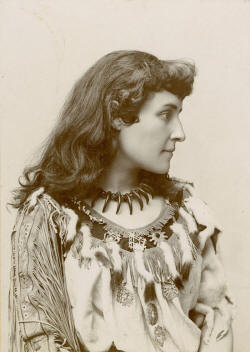

Queer Places:
Chiefswood National Historic Site, 1037 Brant County Hwy 54, Ohsweken, ON N0A 1M0, Canada
Stanley Park Pioneer Cemetery
Vancouver, Greater Vancouver Regional District, British Columbia, Canada
 Emily Pauline Johnson (10 March 1861 – 7 March 1913), also known by her Mohawk stage name Tekahionwake (pronounced dageh-eeon-wageh, literally 'double-life'),[1] was a Canadian poet, author, and performer who was popular in the late 19th and early 20th centuries. Her father was a hereditary Mohawk chief of mixed ancestry and her mother was an English immigrant.[2]
Johnson—whose poetry was published in Canada, the United States, and Great Britain—was among a generation of widely-read writers who began to define Canadian literature. She was a key figure in the construction of the field as an institution and has made an indelible mark on Indigenous women's writing and performance as a whole.
Johnson was notable for her poems, short stories, and performances that celebrated her mixed-race heritage, drawing from both Indigenous and English influences. She is most known for her books of poetry The White Wampum (1895), Canadian Born (1903), and Flint and Feather (1912); and her collections of stories Legends of Vancouver (1911), The Shagganappi (1913), and The Moccasin Maker (1913). While her literary reputation declined after her death, from the late 20th century there has been a renewed interest in her life and works. In 2002, a complete collection of her known poetry was published, entitled E. Pauline Johnson, Tekahionwake: Collected Poems and Selected Prose.
Due to the blending of her two cultures in her works, and her criticisms of the Canadian government, she was also a part of the New Woman feminist movement.
Emily Pauline Johnson (10 March 1861 – 7 March 1913), also known by her Mohawk stage name Tekahionwake (pronounced dageh-eeon-wageh, literally 'double-life'),[1] was a Canadian poet, author, and performer who was popular in the late 19th and early 20th centuries. Her father was a hereditary Mohawk chief of mixed ancestry and her mother was an English immigrant.[2]
Johnson—whose poetry was published in Canada, the United States, and Great Britain—was among a generation of widely-read writers who began to define Canadian literature. She was a key figure in the construction of the field as an institution and has made an indelible mark on Indigenous women's writing and performance as a whole.
Johnson was notable for her poems, short stories, and performances that celebrated her mixed-race heritage, drawing from both Indigenous and English influences. She is most known for her books of poetry The White Wampum (1895), Canadian Born (1903), and Flint and Feather (1912); and her collections of stories Legends of Vancouver (1911), The Shagganappi (1913), and The Moccasin Maker (1913). While her literary reputation declined after her death, from the late 20th century there has been a renewed interest in her life and works. In 2002, a complete collection of her known poetry was published, entitled E. Pauline Johnson, Tekahionwake: Collected Poems and Selected Prose.
Due to the blending of her two cultures in her works, and her criticisms of the Canadian government, she was also a part of the New Woman feminist movement.
Pauline Johnson attracted many potential suitors and her sister recalled more than half a dozen marriage proposals from Euro-Canadians in her lifetime. Though the amount of official romantic interests remains unknown there have been two later romances identified with Charles R. L. Drayton in 1890 and Charles Wuerz in 1900.[12] However, Johnson never married nor remained in relationships for very long despite her reputation of teasing boys in her time in Grand River and her composition of "intensely erotic poetry." Due to her fame, she, unlike many other women of multi-ethnic backgrounds, was unwilling to set aside her racial heritage to placate partners and in-laws and transform into a respectable settler matron.[12] Despite everything, Johnson consistently had a strong network of supportive female friends and attested to the importance they had in her life. In her own words, Johnson stated: Women are fonder of me than men are. I have had none fail me, and I hope I have failed none. It is a keen pleasure for me to meet a congenial woman, one that I feel will understand me, and will in turn let me peep into her own life- having confidence in me, that is one of the dearest things between friends, strangers, acquaintances, or kindred.[12]
My published books: